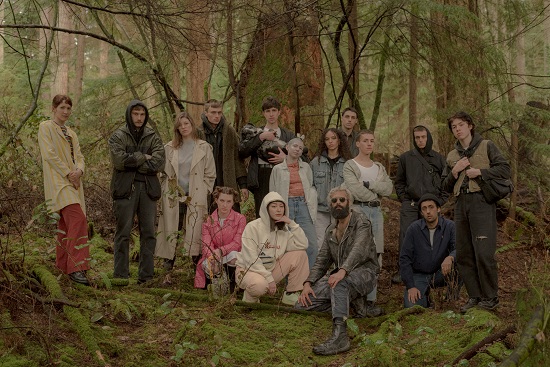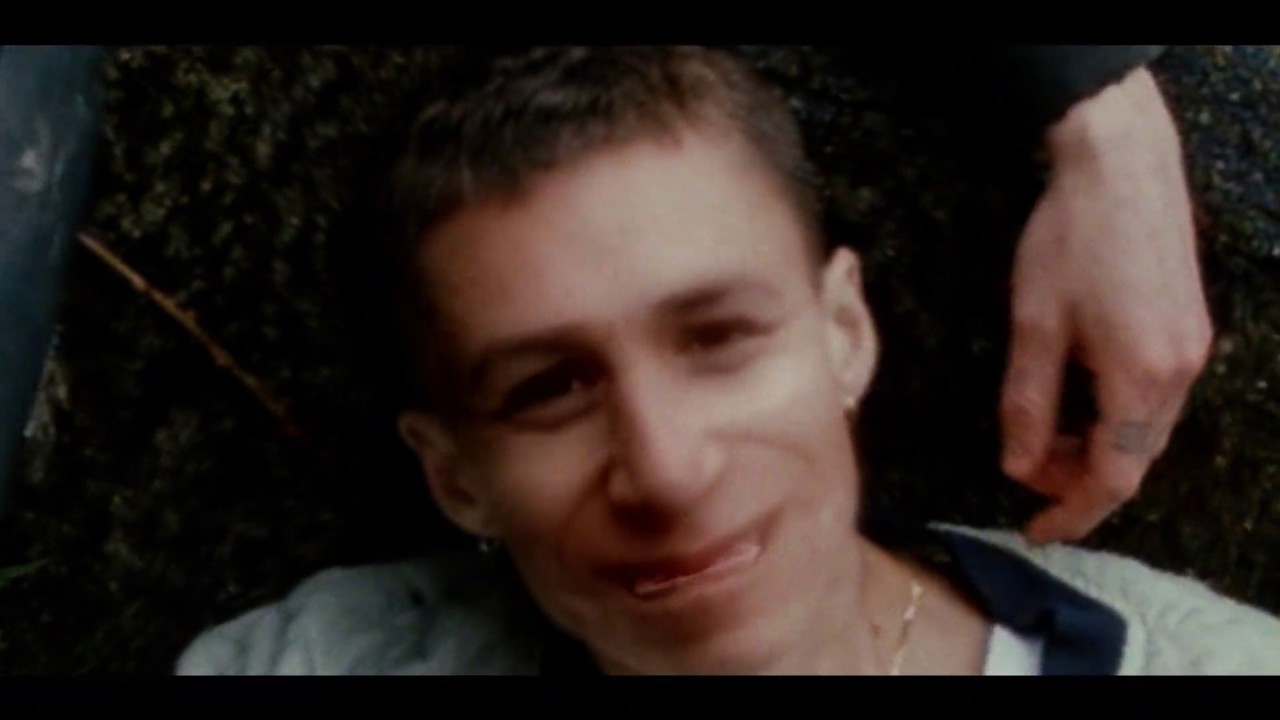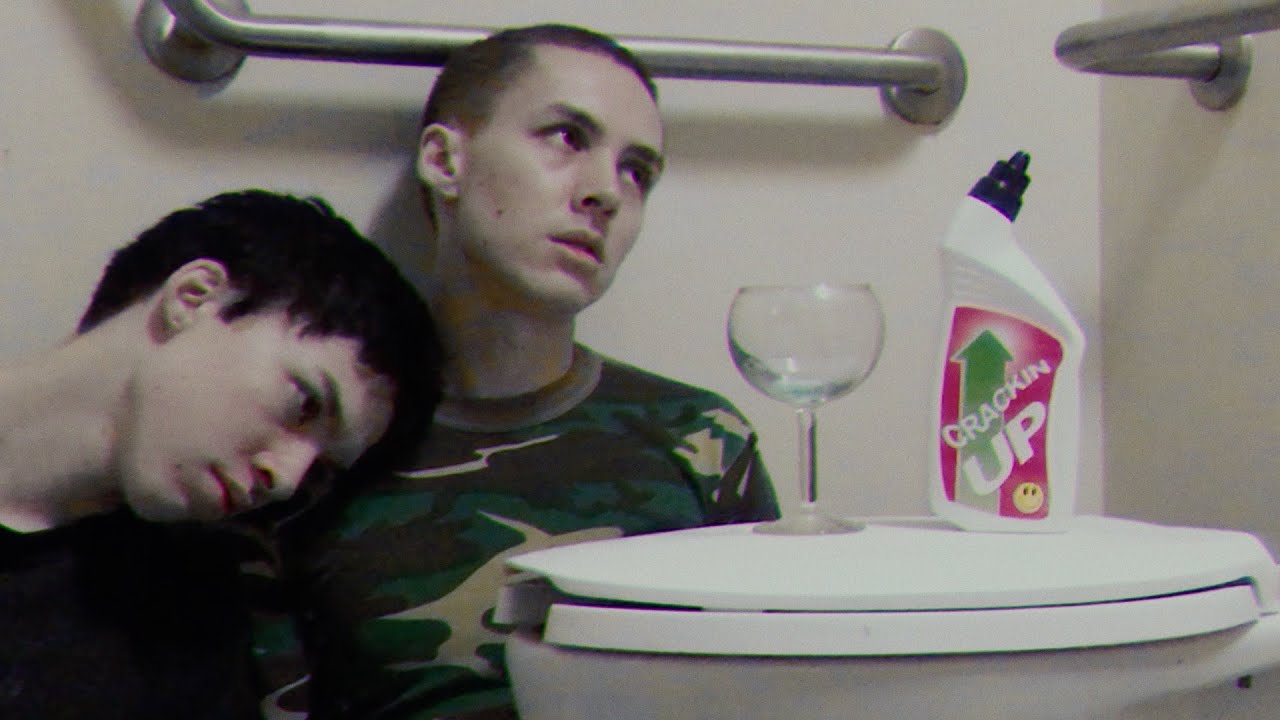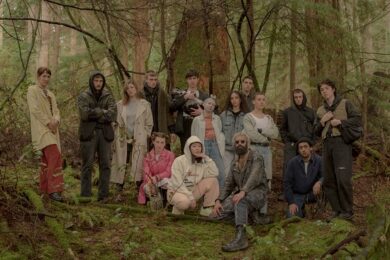Photo by Jennilee Marigomen
The seven members of Crack Cloud, some of their parents, siblings, friends and partners, are all staying in a house in Hvidovre, a quiet suburban town six miles south of Copenhagen. The band are there for a couple of weeks, taking time to regroup around a set at the nearby Roskilde Festival.The property feels busy, but also somewhat idyllic, full of plants and spaces for relaxation, with an expansive garden looking lush in the light rain. The band’s guitar, tin whistle, duck call and sample pad player Mohammad Sharar offers us a coffee, while outside bassist Noah Varley, dressed in a sharp gold suit uncovered during a raid of the Air BnB host’s wardrobe (he’ll later wear it onstage), smokes a cigarette as frontman Zach Choy strums a weathered acoustic guitar. Inside, children’s toys are sprawled over the floor of the lounge as heavy metal plays over the speakers. Eventually, we corral the seven core members of the collective together for an interview, three of them dressed in Crack Cloud merchandise.
Their austere, sometimes paramilitary sartorial choices and staggeringly well-drilled live shows led by Choy’s relentless drums and hard, barked vocals, have frequently seen the band compared to a commune, sometimes even a cult, and it would be easy to work this pleasant Danish scene into that picture. When they’re not touring, Crack Cloud live together in Vancouver’s Downtown Eastside neighbourhood, famous for its history of anarchism, community resilience and social activism, as well as a high prevalence of drug use, poverty, and prostitution. Many band members are employed as support workers in the area.
In an interview with The Guardian last year Choy and Sharar spoke candidly about battles with alcohol, speed, meth, ketamine and other hard drugs as a result of past trauma. The music of Crack Cloud, tightly-wound and relentless, was used to fill the gaps once they got sober. The band, as has been written countless times, is their ‘vehicle for recovery’.
That backstory, combined with the astounding quality of their music, made Crack Cloud something of a music journalist’s dream, but it’s obvious the band have their problems with the way addiction has been made a selling point. They bristle when they hear the word ‘narrative’, and choose their words very carefully. “When people started asking us where we come from it felt like a prerogative to talk about it,” says Choy. “It felt like an obligation to talk about our history, what our motivations were predominantly, and where we come from. And now that we’ve talked about that, other things become interesting, motivations change. That narrative is tiresome.”
“It would be nice for it not to just be like ‘Hey! You used to do drugs! Do you do drugs? What’s up with drugs? Do you like drugs?’” Sharar puts it.
“It’s got to a point where it makes some of us uncomfortable. Not all of us had the same kind of upbringing,” Choy continues. “We did an interview with one publication and by the end, when we saw it, we felt like we were taken advantage of. It was a conversation just like this, it was candid, so we felt really comfortable, talked about some shit, and it became sensationalised. It’s been a learning experience, talking about our shit. Obviously, transparency is important for us and it’s not something we want to tiptoe around, but at the same time people have their own agenda.”
What’s most obvious about Crack Cloud, from listening to their music and from speaking to them in person, is that they are an extremely intelligent band, and one who are always looking forwards. That is not to say that they want to simply ‘move on’ from their past, but rather they feel far more comfortable expressing what they want to say about it through their art, rather than interviews. Where their terse and tight first two EPs, collected as a 2018 self-titled album, drew immediate (and to the band, tiresome) comparisons to Gang Of Four, the material that follows is a distinctly more open-hearted affair. They are currently working on an ongoing series called ‘Pain Olympics’, the first part of which was shared earlier this year in the shape of ‘The Next Fix’, followed by ‘Crackin Up’ two months later. ‘The Next Fix’ is remarkably moving and expansive, opening up the band’s sound into a gorgeous sprawl with a video that celebrates strength through community. Themes of addiction and recovery are more prevalent on the song than they ever were before, but they are very much in the hands of the band.
“The reason why we make art is that it allows us to communicate philosophically on a more profound level,” says Choy. “I’m ambivalent about the purpose of interviews like this. It’s one thing to have these to have these conversations and talk candidly, as support workers within our own community there’s a lot of candid conversation and that’s how you cope and debrief. It’s important to talk about these things, but when it’s being publicised as a means of tokenising…”
“…it’s wack. And it doesn’t make us feel comfortable,” Sharar concludes.
“Things evolve over time, the more time that we’ve all spent together and gelled as this iteration of Crack Cloud, and have talked about a lot of those things, the more it’s starting to come out in the new material,” says Noah Varley, bassist. “In the new album we’re creating together as this group, those themes will be apparent.”
“And not even just centralising around addiction in and of itself but also the implications of a lifestyle of addiction, the influence that you have on other people,” Choy expands. “But then I feel like that’s pretty prevalent for me in those first two EPs too. I just wasn’t as comfortable talking about it so there’s a lot of ambiguity in the lyrics, and a lot of abstraction.”
One of the reasons the video for ‘The Next Fix’ is so moving is that it demonstrates, quite literally with its expanded cast, the wider community that the band represents. In reality, the seven people sat around the Danish coffee table are only the touring iteration of the project, there are dozens of other musicians, visual artists, dancers, filmmakers and more who have contributed to it. Choy is the band’s ‘leader’, in as much as it was him who began the project in his bedroom in Calgary, Alberta. Sharar remembers it first taking the shape it has now at a place in that town called The Red House. “It was an artist space, a home, a venue and a recording studio in the downtown core of Calgary, and it had a revolving cast of artists coming in and out and living there. That’s kind of how a lot of the songs got tracked, it was whoever’s around, whoever’s jamming. Then at some point some of us picked up and moved to Vancouver and the project kept continuing because whoever’s around Zach wants to keep facilitating the art form.”
In Vancouver’s Downtown Eastside, the cast of creatives continued to evolve. As Choy explains it is not just the way Crack Cloud happens to operate, but something key to their philosophical outlook. “In our circles, everything that Crack Cloud is, these are all ideas that manifest from the conversations and the spaces that we share with people in our community. In terms of the output that we have visually and musically it literally is ‘open door’, where people come in and out and like, channelling their energy into what you see on the internet.”
Last time he was in Denmark, Choy paid a visit to Copenhagen’s ‘Freetown Christiania’ district, an anarchist commune within the city’s territory but very much separate from it philosophically, interested in the parallels between the community and Crack Cloud’s home in Vancouver. “The infrastructure’s similar in that it feels open and autonomous to the rest of the city,” he recalls. “It functions differently, the population is very colourful, it has its own economy, definitely less regulated in a lot of ways. From that initial perception of the space it was very familiar to us, but I went back there a few days ago and it felt different, you start to dissect it a bit more, wonder what’s going on behind the scenes. Who’s running the show here? It does become a caricature of itself when it’s selling it’s own merchandise…”
“But so does Crack Cloud!” jokes synth player Daniel Robertson.
“I think it stands out because of the anarchist aspect to it, the lack of conventional structures, which I think is something Crack Cloud is discussing,” says saxophonist and guitarist Bryce Cloghesy. “The state we live in extends to everything, from economics to expression.”
“We take a lot of inspiration from any semblance of infrastructure that’s alternative to what the convention is,” Choy agrees. “The way that Crack Cloud aspires to function as a collective, we want to build that infrastructure that’s separated from a lot of the industry tropes. A lot of the things that you sign up for then you lose your autonomy as a group. I don’t know how Christiania functions, it seems like there’s a lot of autonomy there, but the more we work in the Eastside the more we realise a lot of the exploitation that’s happening, the offhand gentrification, all of the shitty deals that are happening. But as an idealistic concept it’s very attractive. Those spaces at face value were always very attractive.”
Crack Cloud’s story is one that is still being written, and by themselves. It’s a narrative that one senses is only just beginning. As for the next chapter, the band are currently working on their new album between tours, hopefully to be finished by the end of the year. “We have all the means necessary, technologically speaking you can do anything now in the studio, and there’s nothing stopping us really,” Choy continues. “Whenever we have an idea, we can do it at this point. That’s the way we’ve been treating this album, we do what the idea calls for, and it’s yielding some really interesting results. I think we live in this time now where all the archetypes are set down on the table. New sounds are exciting, and taking sounds from all these different places, it’s fun to hear different things in one package, as opposed to locking yourself into a box. There’s always been a leap of faith to this project. It might be a fucking flop, but we’ve learned a lot, technically and emotionally. It’s been a lot of fun and I’m really excited.”






